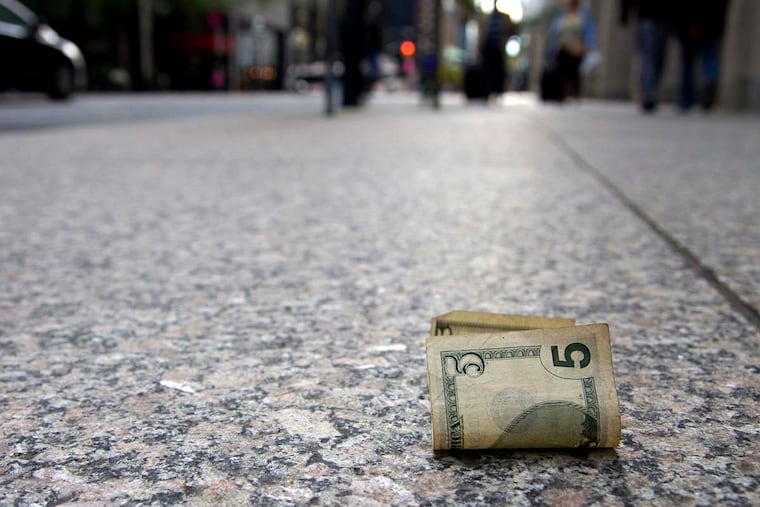13 Common Places to Lose Money
There are plenty of ways to lose money. There are the obvious methods, such as accidentally dropping a dollar or two when you pull out cash to pay for something. But a lot of small decisions can cost you big money over time, especially if you’re not taking advantage of money-saving opportunities or looking for ways to grow it over time

There are plenty of ways to lose money. There are the obvious methods, such as accidentally dropping a dollar or two when you pull out cash to pay for something.
But a lot of small decisions can cost you big money over time, especially if you're not taking advantage of money-saving opportunities or looking for ways to grow it over time. Here are 13 common places people lose money.
Related: 10 Things You're Paying Too Much For
1. Your Budget
The first place where people tend to lose money is in their family or personal budget, said Nathan J. Bachrach, CEO of financial planning firm Simple Money Advisors in Cincinnati. "It's because we don't pay attention," he said.
The majority of Americans do not prepare a detailed written or computerized household budget to track their income and expenses, according to a 2013 Gallup poll. If people took the time to do this, they would not waste as much money, Bachrach said.
If you have avoided creating a budget because it feels restrictive, consider creating a spending plan instead. Figure out where you want your money to go — paying off debt, taking a vacation, saving for a house or retirement — and review your spending patterns to see if they are in line with those priorities. Follow these tips to create a spending plan.
2. Your Paycheck
If your tax withholding is too high, you can also lose money in your paycheck. According to IRS data, more than 70 percent of taxpayers received a refund in 2015, and the average amount was nearly $2,800. That means taxpayers let Uncle Sam hang on to too much of their hard-earned money during the year.
"The government says you have to pay taxes, but nowhere does it say you have to overpay taxes," Bachrach said.
Lower your withholding so you will get more money in your paycheck. Then, have that amount automatically deposited into your 401(k) or an IRA so that it can earn interest and grow, Bachrach said.
File a new W-4 form with your employer to claim additional allowances and ensure that less tax is withheld. The IRS website has a withholding calculator you can use to figure out how many allowances to claim.
3. Lottery Tickets
Americans spent more than $70 billion on lottery tickets in the 2014 fiscal year, according to the North American Association of State and Provincial Lotteries. The NASPL insists that your odds of winning the lottery aren't worse than being struck by lightning. In fact, it states that lotteries award more than $50 million a day.
But for every winner, there are plenty more losers. To increase your odds of getting a return on your money, put the cash you would have spent on lottery tickets toward paying down debt or boosting your retirement savings.
4. High-Interest Debt
A lot of people lose money because they have high-interest debt and have not figured out how much it's really costing them, said Josh Nelson, founder and CEO of Keystone Financial Services. If you do not pay off debt quickly, the interest you owe could result in your paying back much more than the original amount you borrowed.
If you have good credit, consider refinancing low-rate debt, such as home and auto loans. That way, you are not losing money by paying higher rates than necessary, Bachrach said.
5. Unclaimed Assets
States hold billions of dollars in unclaimed assets — money in inactive checking or savings accounts, uncashed payroll checks, refunds, insurance payments, utility security deposits, and more. The federal government also holds lost money. Some of it could be yours.
Visit MissingMoney.com to search its database of unclaimed property records at participating states. Or you can search state by state through the National Association of Unclaimed Property Administrators website. You can use the Where's My Refund? tool at the IRS website to see if you're owed a tax refund. And you can search for unclaimed savings bonds at TreasuryHunt.gov.
6. Your Employer’s 401k Match
Nelson said that plenty of people lose out on a lot of free money because they don't contribute enough to their 401k plan to take advantage of matching contributions from employers.
In fact, one in four plan participants miss out on receiving a full match by not saving enough, leaving an estimated $24 billion of free money on the table every year, according to research by Financial Engines, an independent financial advice company.
Check with your human resources or benefits department to find out if your employer offers a 401k match and how that match is determined. The most common type of match is 50 cents to every $1 contributed by an employee up to a certain percentage of pay — typically 6 percent, according to 401khelpcenter.com.
Related: 5 Ways to Make a Better Plan for Your Money in 2016
7. Insurance Premiums
People often lose money on their insurance premiums because they don't take advantage of discounts, Bachrach said. For example, if you need both auto and homeowners insurance, you often can get a discount of at least 10 percent if you bundle your policies with one company, he said.
Insurance companies also offer discounts on auto insurance premiums to some policyholders, such as those who keep their annual driving within certain mileage limits, or parents of a student driver with good grades. However, it's often up to you to ask about discounts in order to get them, Bachrach said.
You also might lose money if you set your insurance deductible too low. Raising your homeowners insurance deductible to $1,000 could shave 25 percent off your premium, according to the Insurance Information Institute.
8. ATM Fees
You might be losing money when you withdraw cash from an ATM if you are not using one in your bank's network. Not only will your bank charge you for using an out-of-network ATM, but you will also get hit with a fee from the bank whose ATM you are using. Some studies have found that these fees can top $4 on average.
Apps such as the free ATM Hunter can help you find your own bank's ATM so you don't get hit with charges. Or if you need to pick up a few things from the store, you typically can get cash back without a fee when you make a purchase at a supermarket.
9. Investment Fees
Your retirement account might lose money unnecessarily because you have chosen investments with high fees. "People have no idea what they're paying for investments," Nelson said.
Plan administration fees and investment fees eat into your returns and reduce the amount of money you will have for retirement. For example, if fees and expenses on your account are 1.5 percent, your balance will be 28 percent smaller at retirement than if the fees had been just 0.5 percent, according to the U.S. Department of Labor.
10. Late Fees
More than one-third of consumers paid late bills in 2014, according to a survey conducted by Fiserv, a provider of financial services technology. That's an easy way to lose money because companies often impose fees for late payments.
For example, federal law allows credit card companies to charge $25 for the first payment that's at least 21 days late, and $35 for a second late payment in six months.
If you are having trouble remembering to pay bills, set up automatic payments through your bank and service providers. You can also use apps such as Mint Bills to receive alerts when bills are due to avoid late fees.
11. Energy Vampires
You probably have plenty of electronic devices that cause you to lose money because they suck energy even when they are turned off. Energy vampires such as cable TV boxes, DVD players and video game consoles can account for up to 20 percent of your energy bill, according to Duke Energy, the nation's largest electric company.
For help identifying your home's energy vampires, see Duke Energy's list of devices that consume electricity when turned off.
12. Your Landline
Consumers spend an average of $357 a year on residential phone service, according to the Labor Department's Consumer Expenditure Survey. But it is an expense that might be unnecessary. "If most people are reaching you by cellphone, get rid of the landline," Bachrach said.
Stop losing money on a service you do not use and join the 45 percent of households that have ditched their landline telephone service and rely only on wireless service, according to the Centers for Disease Control and Prevention's National Health Interview Survey.
Related: 20 Money Mistakes You're Making Right Now
13. Furniture
Nelson said that he has clients who operate an estate-sale business, and they often find cash, coins and jewelry squirreled away in furniture before they sell it. So if a relative dies, always check the house and its contents for money that has been lost or forgotten, he said.
If you are tempted to stash cash in a hiding spot in your house, you will be less likely to lose it if you put it in an interest-bearing savings account, money market account or certificate of deposit with a bank or credit union.
Your deposit will be insured up to $250,000 through the Federal Deposit Insurance Corporation or the National Credit Union Administration. With interest rates as low as they are now, your money won't grow quickly — but you won't lose any of your principal.
----

This article originally appeared on GOBankingRates.com:
13 Common Places to Lose Money
GOBankingRates.com is a leading portal for personal finance news and features, offering visitors the latest information on everything from interest rates to strategies on saving money, managing a budget and getting out of debt.